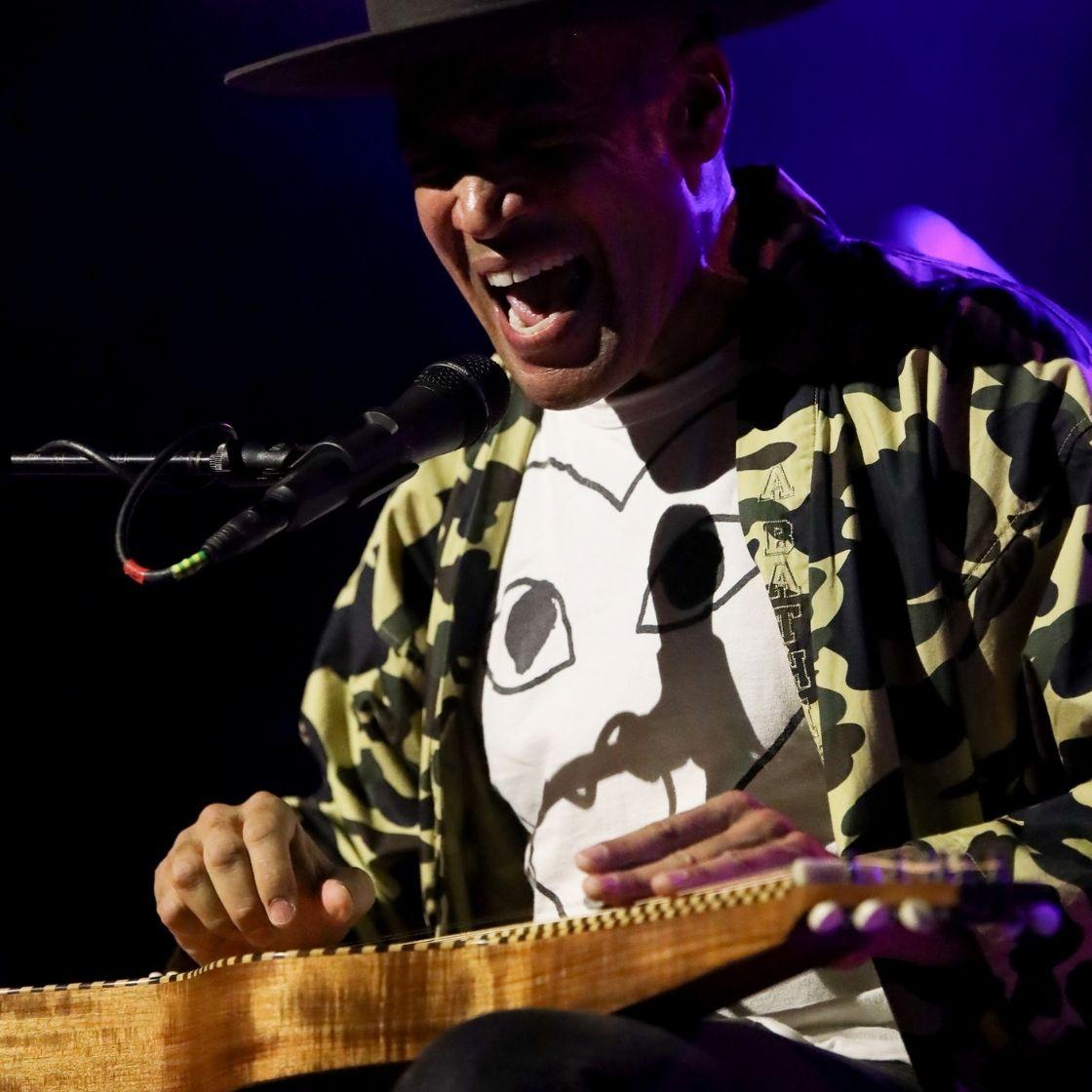Ben Harper is known as a lot of things: multi-instrumentalist, singer-songwriter, Grammy winner, philanthropist - all-round Rock God.
Yet despite his extensive accolades, the father-of-five is not immune to, nor above, the everyday battles mere mortals face, such as wrestling with your daughter for control of the air conditioning, or fighting for equal rights in a system designed for people of colour to fail.
"My daughter likes it so cold... I've given birth to polar bears up in here," the three-time Grammy Award winner jokes as he returns to our Zoom call following a brief pause to battle said polar bear.
"It's freezing. We're having air-conditioner-wars over here."
It could be said that it was Ben Harper's birthright to become a musician. The born-and-bred SoCal artist previously revealed that John Lomax - a pioneering musicologist dedicated to the preservation of American folk - taught his grandmother to play guitar. His grandparents owned the Folk Music Center - an iconic Californian music shop and museum of rare instruments, once frequented by patrons Leonard Cohen and Taj Mahal. A treasured heirloom for more than six decades, Harper - whose repertoire spans the slide guitar, the lap steel, the piano, bass and drums - had music in his blood.
Growing up, Harper cut his teeth listening to the likes of Cat Stevens, Bob Dylan, Marvin Gaye, Bob Marley and Delta blues, forming the blueprint for his own eclectic hybrid of folk, blues, roots, funk, rock and reggae - a successful formula that won Harper both critical acclaim and respect among music's elite.
Speaking to Newshub ahead of the release of his latest album - the muso's self-proclaimed most political project to date - the 51-year-old appears laidback and in good spirits. The project is Winter Is For Lovers, a purely instrumental record featuring just Harper and his lap steel guitar - an instrument typically played horizontally on the lap, as the name would suggest, popularised by American blues artists in the 20th century.
Described as his attempt at a lap steel symphony, the album spans 15 bare-bones, but beautiful movements. The stripped-back production places the lap steel front-and-centre, showcasing Harper's enduring dedication to its mastery - creating a sound as intimate and warm as it is stark and spare, almost as if Harper is playing a private show from the living room sofa.
"My inspiration is a life-long relationship with lap steel guitar. This is a record I've been aiming towards for as long as I've been playing, so my motivation is my love for the instrument," he explained.
Yet performing in living rooms is now an unexpected reality for Harper, as the US grapples to free itself from the claws of COVID-19 (SARS-CoV-2), the coronavirus responsible for the deaths of 263,000 Americans and counting - and more than 1.43 million deaths worldwide at the time of writing.
The disease has found a firm foothold in the US and the prospect of live performances - a pleasure once taken for granted - is now a privilege reserved for those lucky enough to have a musician in their inner circle.
"I miss performing live so much that a friend of mine asked me to play a couple of songs for him and his girlfriend, and I did it. After the first song, they clapped, and I was taken aback because I hadn't heard applause in eight months," Harper said wistfully. "Two people just in their living room sounded like 2000. I couldn't believe it, because I've been playing to an empty room for so long."
The release of Winter Is For Lovers is also aptly set against a backdrop of ongoing socio-political turmoil, spilling through the deepening divides of American society. Pandemic, protests and politics - a summation of perhaps one of the most challenging years in recent history, particularly for the US. With an outgoing President refusing to concede defeat; the deaths of several Black men fuelling a nationwide movement to put an end to systemic racism; and the ongoing battle to contain a deadly virus, 2020 has thrust America's star-spangled banner under a police siren's red glare with disinfectant fumigating the air.
"It's having a daily impact for sure. It's feeling like the end of something. It's feeling like the end of a very specific dream, like the last breath of American democracy in a way," Harper mused.
"It's bringing into question the future in ways that I hoped wouldn't come to pass."

The ongoing Black Lives Matter protests are particularly poignant for Harper, who previously revealed that he has been a victim of police brutality on more than one occasion. With a father of African-American and Cherokee ancestry and a Jewish mother - both at the fore of California's '60s counterculture - Harper has frequently used his music as a vessel to voice the bicultural experience, writing on issues of race and systemic injustice.
"I've been singing in the name of Black Lives Matter for 25 years. I've always sung that."
Winter Is For Lovers is no different. It's estimated that 70 to 93 percent of all communication is nonverbal - and despite being void of vocals, the instrumental record speaks volumes.
"This record actually is the most political record I've ever made, because it's looking at the times we're in and basically saying - I'm freaking speechless," he explained.
"The only thing I can do is play the guitar right now."

With the prospect of touring still relegated to the distant future, at least Harper has fond memories of his final international escapade before the pandemic took hold. With his Māori-inspired ink on full display, it's no secret that Harper has a special connection to Aotearoa. His last live shows were played at Auckland's Logan Campbell Centre in February, prior to the widespread border closures and countless gig cancellations.
"The last place I played was New Zealand, that was my last gig. I had the best time, this past trip was great. It was hard to come home," he shared.
"New Zealand is like a dream I always keep with me wherever I go. I've got such deep ties in Southern California, it's hard for me to leave - but if I could just press a button and go anywhere, it would be there."

Q&A with Ben Harper
What is the overarching narrative or thematic thread running through Winter Is For Lovers?
Although there are 15 movements, the record is one piece. I composed it as my attempt at a lap steel symphony, as an A and a B side for vinyl. I ended up dividing it into 15 parts for the modern necessity of distribution. A 35 minute lap steel guitar piece didn't quite fit those formats, so I had to break it down.
In breaking it down, I gave the different movements titles, which ended up being places that influenced the record or places where the pieces were written.
What's your history with the lap steel guitar and what does the instrument mean to you?
The instrument to me represents a life's commitment to a sound. I have been working at it, and on it, and with it - I've put the most time into it out of any instrument that I play. We're a footnote in a subculture, lap steel guitar players. It's fun to make a contribution in the name of a style that's not necessarily obvious.
Winter Is For Lovers is a niche project - do you ever become concerned with the commercial aspect of your music? Has mainstream success ever been a factor for you?
This is not me being self-deprecating or disingenuously humble - every record I have ever made has been a niche project. Although there have been people from labels who have put a good amount of time and energy into promotion... my commercial success has been, by and large, a surprise - even to the people who promote it.
So mainstream success is just an added bonus?
If it happens, I'm all about it, all day - but it's never up to me or the record companies. Something has to click in a way you can't predict for things to take that upward swing.

You've dabbled with instrumentals throughout your 25-year career - why did now feel like the right time to make a purely instrumental project?
It actually took this long for the record to be done. It sounds like a record that could've been made during quarantine and such, but it's been on the books to be released for eight months now. Why now? It was done, it was going to be released regardless of social, environmental circumstances. More importantly, it took me a long time to finish this record. I'm just excited that it's coming out, and we didn't have to postpone it.
As you mentioned, it feels as though this record could've been recorded during quarantine. It's stripped down, bare-bones, intimate - just you and the lap steel guitar. It's almost a representation of that solitude many of us have been going through. Do you think the music is going to resonate, particularly now, given the circumstances?
I think people who know my music know that this sound is something I've been deeply committed to for a long time, so it won't catch those people off-guard. I think if you're hearing the music I make for the first time, I think it definitely can resonate in the way that it represents the solitude that we're all somehow connected [with] right now.
What was it like recording a solo project? Was it almost cathartic?
It was like looking through a microscope under a magnifying glass from 30,000 feet. It was a challenge I hadn't expected. I thought I'd be able to play this thing front to back, but there's no lyrics to hide behind - no singing, no band. To be that exposed caught me off-guard. It's one thing to record a song or two as an instrumental, as I've done over the years - but I've never recorded a 30-plus-minute piece in one go with no lyrics. As much as I thought I was going to breeze through it, it took a few passes - full disclosure.
For people who may discover you through this record, what do you hope new listeners will take away from it? Is there a specific journey you had in mind?
I've always approached my music as if every single record I make is my first. If this is the first record of mine that people will hear, that's exciting. It introduces who I am and my commitment to the lap steel very clearly. There's a part of me that loves the fact that [this record] will be my introduction to some people.
Ideally, I would like it to bring out people's individual emotions, and they can use the music as the soundtrack to those emotions. I don't want to sound overly earnest or tell anyone what to feel... but anything that makes you feel - I mean, I go through my day trying to feel something.
With the current climate, it doesn't look like people will be enjoying live music anytime soon. What's your plan with promotion?
I don't know. By the end of the year, if there's nothing possible, I'll probably do one event online. As far as getting out in front of people, that probably won't happen until next American summer.
I just know I want to contribute to whatever is most safe.
Ben Harper's Winter Is For Lovers is available to download on all streaming platforms.



